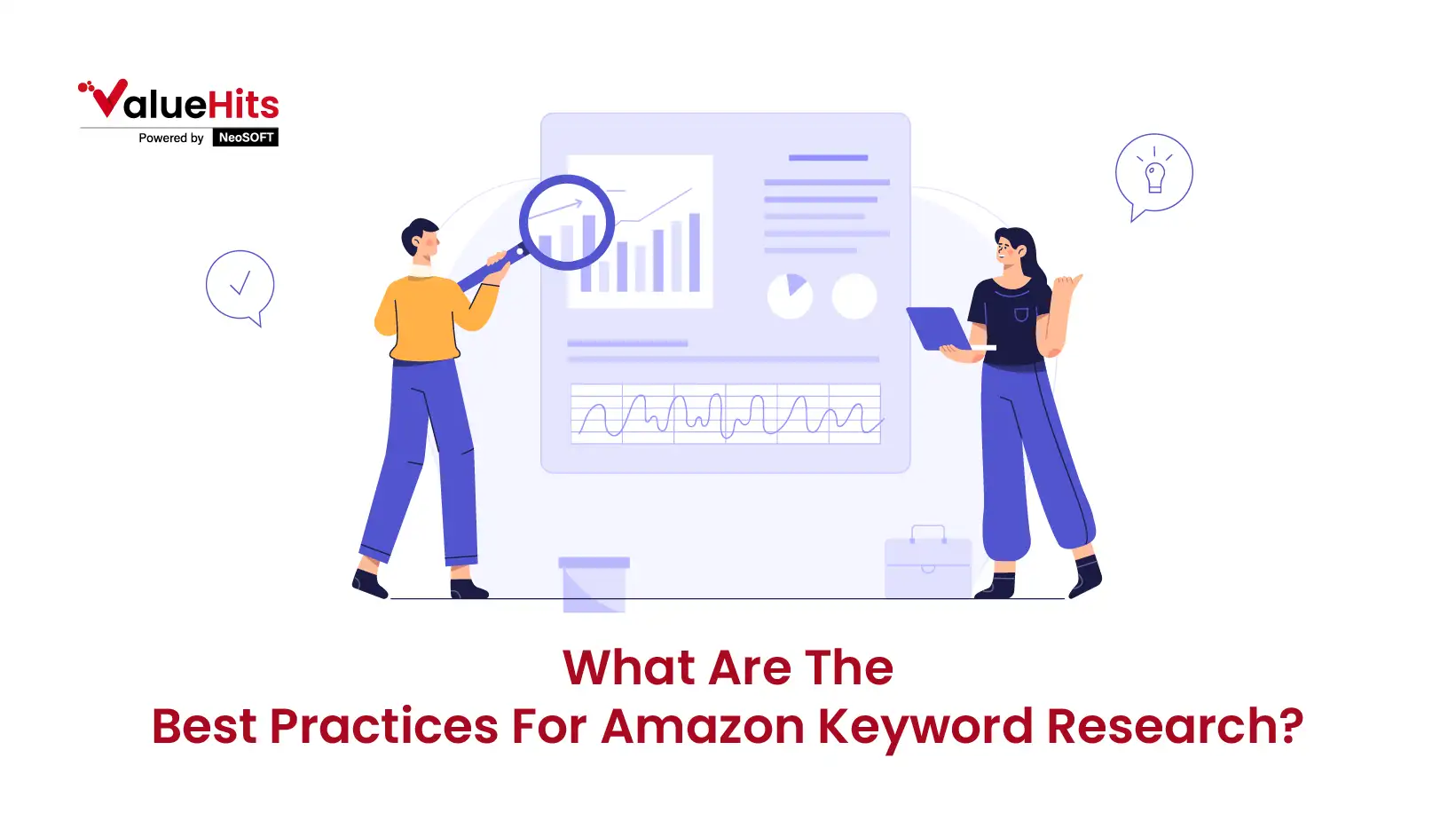KEYWORDS: Amazon Keyword tips for increasing sales The Ultimate Guide to Amazon Keyword Research amazon marketing company amazon advertising management amazon marketing agencies amazon keyword research best practices Amazon Keyword Tips for Increasing Sales in 2024
What Are The Best Practices For Amazon Keyword Research?
Keyword research is integral to attaining decent success on the Amazon platform. One needs to make enough effort to understand what your ideal customers are searching for and to determine your product or service's revenue potential even before you start selling it. This will help you build a successful Amazon business.

Keywords are very essential once your products are live on Amazon. Adding keywords to listings and your PPC ads boosts your chances of customers finding your products and services, resulting in a more significant boost in your sales.
Today, from ValueHits experts, you’ll learn how to conduct Keyword research for Amazon and make your business on Amazon a great success.
Why is Amazon Keyword Research Important?
Keyword research provides insights into the search terms that are used when they are looking for some services for specific products on Amazon or Google. Therefore, implementing these keywords in your listing makes you rank higher on Amazon’s search results. Now, ranking higher will allow you to get more customer attention to your Amazon ads and, ultimately, higher sales. This whole keyword research process plays a key role in a long-term business because it reduces your marketing costs and boosts your margins.
How can you Drive Targeted Traffic on Amazon?
1. Concentrate on your Amazon audience first.
Even before you start figuring out your keywords for Amazon products, you must make sure which type of audience you’re trying to reach. Many businesses make the major mistake of building an all-in-one plan for Amazon and Google. One needs to understand that all search engines have different requirements.
2. Use Amazon-specific keyword tools
When you are searching keywords for your Amazon product listing, use tools that are specific to Amazon. Remember that Amazon users search differently than Google users. Keywords that are ideal for Google won’t necessarily fit in Amazon's algorithm. So, understand that the search intent on Google is very different than that on Amazon. To gain the best keywords for your business, try using Amazon's keyword research tools. With these tools for Amazon keyword research, you will get all the keywords suitable for your business that are performing very well on Amazon’s platform.
You can try tools such as Sonar and Keyword tools. Both tools are great and allow you to see the search volume of every keyword.
Use the search bar to check other available keywords. When you type your base keyword, you will see what keywords users are typing to search for a similar query.
With this strategy, you can generate several ideas for your specific keywords, which you can use in product listings.
Using Amazon-specific keyword research tools, you can identify relevant keywords for your Amazon listing.
How to Improve Conversion Rates?
-
Only use relevant keywords.
It is important to use relevant keywords on the Amazon platform for optimization. When trying to sell your products on Amazon, the ultimate goal of any business is to gain maximum conversions. You must pick the best keywords to gain valuable traffic. Always remember to pick keywords that suit your product listings. However, certain companies will talk you into adding and incorporating irrelevant keywords with high search volume to reach the maximum audience.
The problem with this strategy is that your product needs to be more relevant to these keywords. If you are conducting Keyword research for Amazon related to Polaroid cameras and find a listing about water bottles, you would think about how that’s relevant to Polaroid cameras, right?
This is what happens when companies work to rank based on irrelevant ( higher ranking) keywords. Any user searching for a Polaroid camera is not willing to see a listing for a non-relevant product, i.e. water bottle, because it has nothing to do with the search intent by the user.
Big platform, Amazon, is very familiar with this bad practice. Your business or company can get penalized for using irrelevant keywords. This practice will badly affect your ranking on Google as well as Amazon because you will fail to earn any conversions.
It also hurts your ranking because you won’t earn many conversions if you appear in irrelevant search results.
To get the soundest results for product listing, use keywords associated with your product. This strategy will guarantee you maximum relevant leads and higher conversions.
How do you choose keywords that align with your customer purchasing behavior?
When you want to rank your keyword, it's an excellent strategy to check what keywords your competitors are using. Check how their marketing and products perform outstandingly than others. Pricing also plays an important role in Amazon's ranking. If your pricing is higher than that of your competitors, surely, it will rank them over you.
Next, monitor your keyword performance. This will help you understand whether your keywords are driving high traffic to your listings. If they are not driving traffic, you can choose to swap those keywords to align better with your customer’s search intent.
Best practices for Amazon keyword research
-
Understanding Amazon's Algorithm
This is a great Amazon secret that we are revealing, which considers factors, such as product relevance, reviews, and sales to make your product rank higher on Amazon. Happy customers are the master key. Make sure to focus on keywords that match the search features of your customers.
-
Identifying Relevant Keywords
Keywords are very important, and therefore, you need to choose those that match your product to reach the desired audience. While conducting research make sure to use the best Amazon keyword research tool for finding relevant ones.
-
Competitor Analysis
Closely monitor all your competitors, and check what strategy and keywords they are using. Learn from them, adapt to their strategies and avoid their mistakes.
-
Long-Tail Keywords and Niche Targeting
These are crucial, long-tail keywords that have the potential to attract targeted buyers. Focus on a set of specific audiences to be unique from the rest. You can also use multiple long-tail keywords to build a wider net.
-
Monitoring and Adjusting Keyword Strategy
Monitor and track all your keywords closely; remember that data is your friend. Use analytics to search for areas of improvement.
-
Avoiding Basic Mistakes
Avoid keyword stuffing at any cost; ensure you do not force any keywords in your content, as it will damage its readability. Also, avoid misleading the audience with irrelevant keywords.
Conclusion
Wrapping up, we would like to say that depending on the type of product or business, and your level of expertise in Amazon keyword research any of these approaches will help you when you use highly relevant keywords in your content. There’s one great tool called Scribbles that helps you do keyword research for a product that you have already optimized, it will help you check whether you have used the keywords or not.
Remember, the keywords are indexed all over the page.
Always take a balanced approach, keeping your possible customers in mind. Boost the number of keywords in your listing without hampering the relevant information for your customers that lets them decide whether the product is right for them or not.
Organically add your keywords to your Amazon advertising or other content. Indexing is the main step. Once you develop a product page rich in your keywords, you can use a combination of techniques to drive traffic and gain maximum conversions.
FAQs
-
Why does keyword research play a key role for sellers on Amazon?
Keyword research has the power to influence product visibility search rankings and eventually increasing sales. Therefore, identifying and using the right keywords not only helps you give the chances of reaching the target audience but also boost your ranking on Amazon.
-
How do I get relevant keywords for my products on Amazon?
It's easy. You can get relevant keywords using a combination of competitor analysis and Amazon Keyword Research tools like Amazon's Search Term Report or third-party tools.
-
Why is competitor analysis important for keyword research?
Competitor analysis will help you navigate and check which keywords are performing well for products that are similar to yours. With this extraordinary insight, you can refine and polish your strategy as needed.
-
Should I use long-tail keywords on Amazon? Is it necessary?
Yes, they offer several benefits from a PPC and SEO point of view as they serve specific customer queries, resulting in better-targeted traffic.
-
Can I only use Amazon's built-in keyword tools?
While Amazon's tools are very important, it is recommended that you use other external tools to get better and more detailed data.
-
Which common mistakes should we avoid during Amazon keyword research?
Very common mistakes that one must avoid are keyword stuffing, not using long-tail keywords, and not adapting to changes in customer behavior.
-
How do I accommodate my keyword strategy to changes in Amazon's algorithms?
Stay updated and informed regarding the updates to Amazon's algorithms, which will help you. Keep checking the changes regularly, take part in seller forums, and keep an eye on official announcements to adjust your keyword strategies.
A Step-by-Step Guide to Set Up Google Ads Conversion Tracking for Different Sources
March 7, 2025
Google Ads are a part of digital marketing; therefore, tracking the eff
Digital Marketing Agency Cost: How Much It Costs To Market Your Business in 2025
February 28, 2025
Marketing is no longer a luxury but a necessity for business organizati
16 Powerful Facebook SEO Tips to Optimize Your Business Page
February 21, 2025
Optimizing your Facebook presence has become very important for expandi
